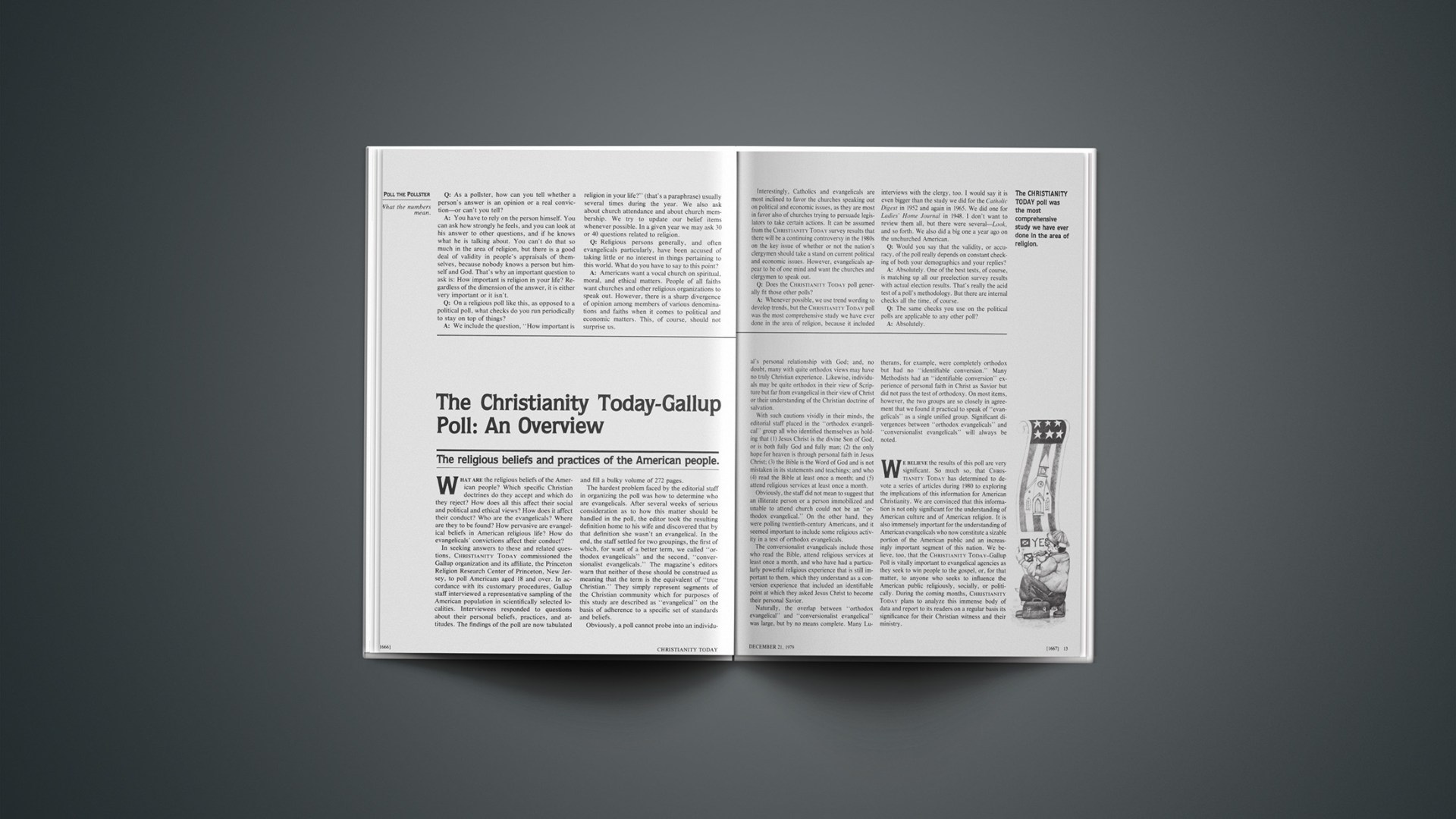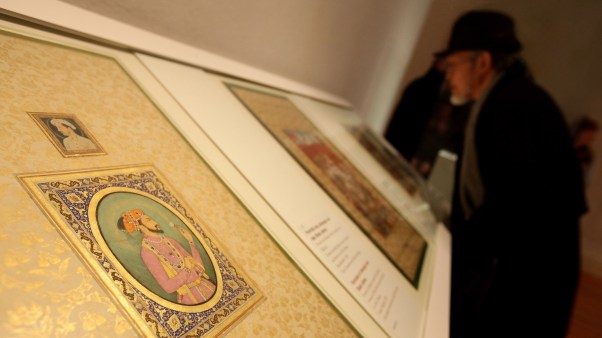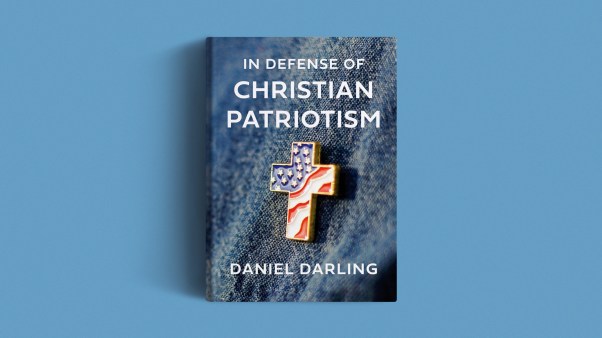What are the religious beliefs of the American people? Which specific Christian doctrines do they accept and which do they reject? How does all this affect their social and political and ethical views? How does it affect their conduct? Who are the evangelicals? Where are they to be found? How pervasive are evangelical beliefs in American religious life? How do evangelicals’ convictions affect their conduct?
In seeking answers to these and related questions, CHRISTIANITY TODAY commissioned the Gallup organization and its affiliate, the Princeton Religion Research Center of Princeton, New Jersey, to poll Americans aged 18 and over. In accordance with its customary procedures, Gallup staff interviewed a representative sampling of the American population in scientifically selected localities. Interviewees responded to questions about their personal beliefs, practices, and attitudes. The findings of the poll are now tabulated and fill a bulky volume of 272 pages.
The hardest problem faced by the editorial staff in organizing the poll was how to determine who are evangelicals. After several weeks of serious consideration as to how this matter should be handled in the poll, the editor took the resulting definition home to his wife and discovered that by that definition she wasn’t an evangelical. In the end, the staff settled for two groupings, the first of which, for want of a better term, we called “orthodox evangelicals” and the second, “conversionalist evangelicals.” The magazine’s editors warn that neither of these should be construed as meaning that the term is the equivalent of “true Christian.” They simply represent segments of the Christian community which for purposes of this study are described as “evangelical” on the basis of adherence to a specific set of standards and beliefs.
Obviously, a poll cannot probe into an individual’s personal relationship with God; and, no doubt, many with quite orthodox views may have no truly Christian experience. Likewise, individuals may be quite orthodox in their view of Scripture but far from evangelical in their view of Christ or their understanding of the Christian doctrine of salvation.
With such cautions vividly in their minds, the editorial staff placed in the “orthodox evangelical” group all who identified themselves as holding that (1) Jesus Christ is the divine Son of God, or is both fully God and fully man; (2) the only hope for heaven is through personal faith in Jesus Christ; (3) the Bible is the Word of God and is not mistaken in its statements and teachings; and who (4) read the Bible at least once a month; and (5) attend religious services at least once a month.
Obviously, the staff did not mean to suggest that an illiterate person or a person immobilized and unable to attend church could not be an “orthodox evangelical.” On the other hand, they were polling twentieth-century Americans, and it seemed important to include some religious activity in a test of orthodox evangelicals.
The conversionalist evangelicals include those who read the Bible, attend religious services at least once a month, and who have had a particularly powerful religious experience that is still important to them, which they understand as a conversion experience that included an identifiable point at which they asked Jesus Christ to become their personal Savior.
Naturally, the overlap between “orthodox evangelical” and “conversionalist evangelical” was large, but by no means complete. Many Lutherans, for example, were completely orthodox but had no “identifiable conversion.” Many Methodists had an “identifiable conversion” experience of personal faith in Christ as Savior but did not pass the test of orthodoxy. On most items, however, the two groups are so closely in agreement that we found it practical to speak of “evangelicals” as a single unified group. Significant divergences between “orthodox evangelicals” and “conversionalist evangelicals” will always be noted.
We believe the results of this poll are very significant. So much so, that CHRISTIANITY TODAY has determined to devote a series of articles during 1980 to exploring the implications of this information for American Christianity. We are convinced that this information is not only significant for the understanding of American culture and of American religion. It is also immensely important for the understanding of American evangelicals who now constitute a sizable portion of the American public and an increasingly important segment of this nation. We believe, too, that the CHRISTIANITY TOADY—Gallup Poll is vitally important to evangelical agencies as they seek to win people to the gospel, or, for that matter, to anyone who seeks to influence the American public religiously, socially, or politically. During the coming months, CHRISTIANITY TODAY plans to analyze this immense body of data and report to its readers on a regular basis its significance for their Christian witness and their ministry.
How The Public’S Religious Beliefs Shape Up
Ten Findings that Will Surprise You
• One of every five adults 18 years old and over—31 million persons—is an evangelical.
• Almost one in five adults (19 percent) considers himself or herself Pentecostal or charismatic, but of those 29.4 million persons, 23.5 million have not spoken in tongues.
• Better than one-third of the adult population have had a life-changing religious experience. For 50 million people, this experience involved Jesus Christ, and for 39.5 million people this was a conversion that included asking Christ to be personal Savior.
• Almost half—69 million people 18 and over—are hoping to go to heaven only because of their personal faith in Jesus Christ.
• More than eight of every ten persons believe Jesus Christ is divine.
• Sixty-five million adults believe the Bible is inerrant.
• Fifty million go to the Bible first to test their own religious beliefs.
• Seven out of ten adults believe the devil is either a personal being (34 percent), or an impersonal force that influences people to do wrong (36 percent).
• Half of the adults in the U.S. believe God created Adam and Eve to start the human race.
• A whopping 84 percent—more than eight of every ten people—believe the Ten Commandments are valid today.
On the other hand, the public ran pretty much true to form on these religious matters:
• More than 100 million adults are members of a church or synagogue.
• Almost everyone (94 percent) believes in God or in a universal spirit.
• Nearly 40 million go to church weekly and 17 million go more than once a week.
• Only 11 percent read the Bible every day, compared to 10 percent who read it weekly and 7 percent monthly. Thirty-seven million adults never read the Bible.
• Fewer than three in ten correctly identify, “Ye must be born again,” as the words of Jesus to Nicodemus.
• Fewer than half (42 percent) can name at least five of the Ten Commandments.
• Barely over one-tenth of the public tests religious beliefs first by what the church says.
Who Are The Evangelicals And What Do They Believe?
As One Might Expect, According to the Christianity Today-Gallup Poll:
• More of them are female (62 percent) than male.
• One-fourth of them have completed college, while nearly one-fifth have a grade school education only.
• Nearly half (43 percent) live in the South, about one-fourth in the Midwest, and of the remainder, 15 percent live in the West and 17 percent in the East. Half live outside of metropolitan areas; nearly four in ten live in towns with less than 2,500 people.
• Roughly one in ten are professional or business people, while one-fourth do manual labor. By income, they are evenly divided between low, middle, and upper brackets, although 16 percent earn less than $5,000 per year. Fifteen million are not “working”—such as housewives, students, retirees.
• Nearly three-fourths are married; only 5 percent are divorced or separated. Nearly half have children in their households.
• Slightly less than half read the Bible every day; about one in five reads it weekly; about one-fifth read it two or three times a week—in short, approximately 85 percent read it at least weekly.
• They believe, by almost an eight to one margin, that God created Adam and Eve to start human life.
• Almost all (92 percent) are church members and nearly half give beyond the 10 percent tithe of their income to churches and religious organizations.
• More than one-third attend church at least twice per week, and eight out of ten attend church at least weekly.
• One out of five talk to others about their faith daily or more often, while nearly half do so at least once a week.
On the other hand, some unexpected facts were uncovered about evangelicals:
• Nearly four million of the total 31 million are Roman Catholics.
• More than one-third consider themselves Pentecostal or charismatic Christians. Of these, three-fifths (62 percent) have never spoken in tongues.
• Only six in ten can correctly identify, “Ye must be born again” as the words of Jesus to Nicodemus.
• Only half can name five of the Ten Commandments.
• Fifty-seven percent say their life-changing religious experience was “gradual,” not sudden.”
• Almost three in ten do not think of the devil as a personal being.
• More than one in five live in large cities (pop. 5000,000 or over), but only 16 percent live in the suburbs. Three in ten live in central city areas.
• About half again as many are Democrats as are Republicans. (This finding perhaps surprises northern evangelicals, who tend to identify Christians as Republicans.)
• Nearly eight out of ten evangelicals affirm to having had a life-changing religious experience. Of these, only 2 percent say this experience did not involve Jesus Christ, and less than 1 percent say this experience is not important now.










